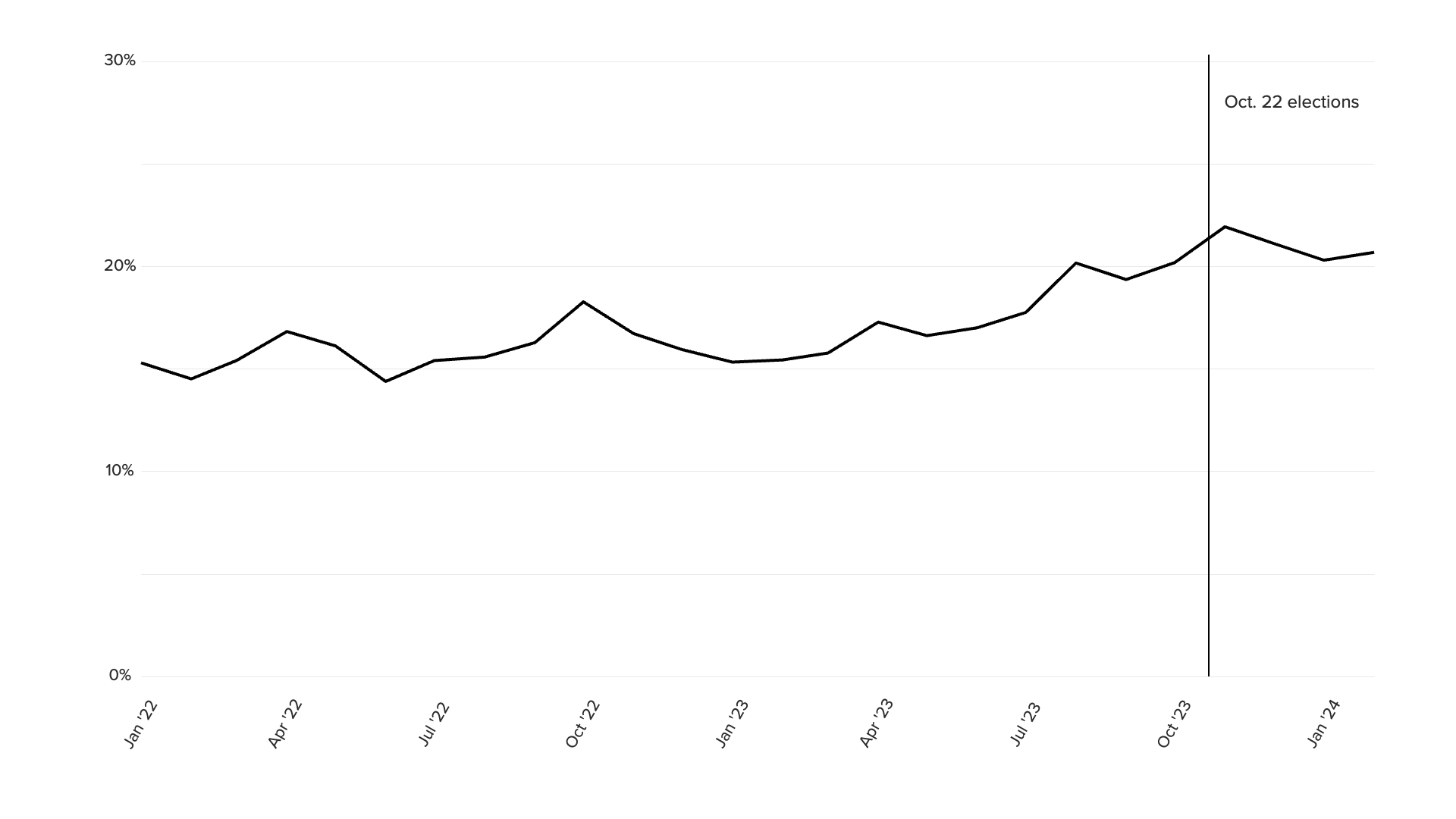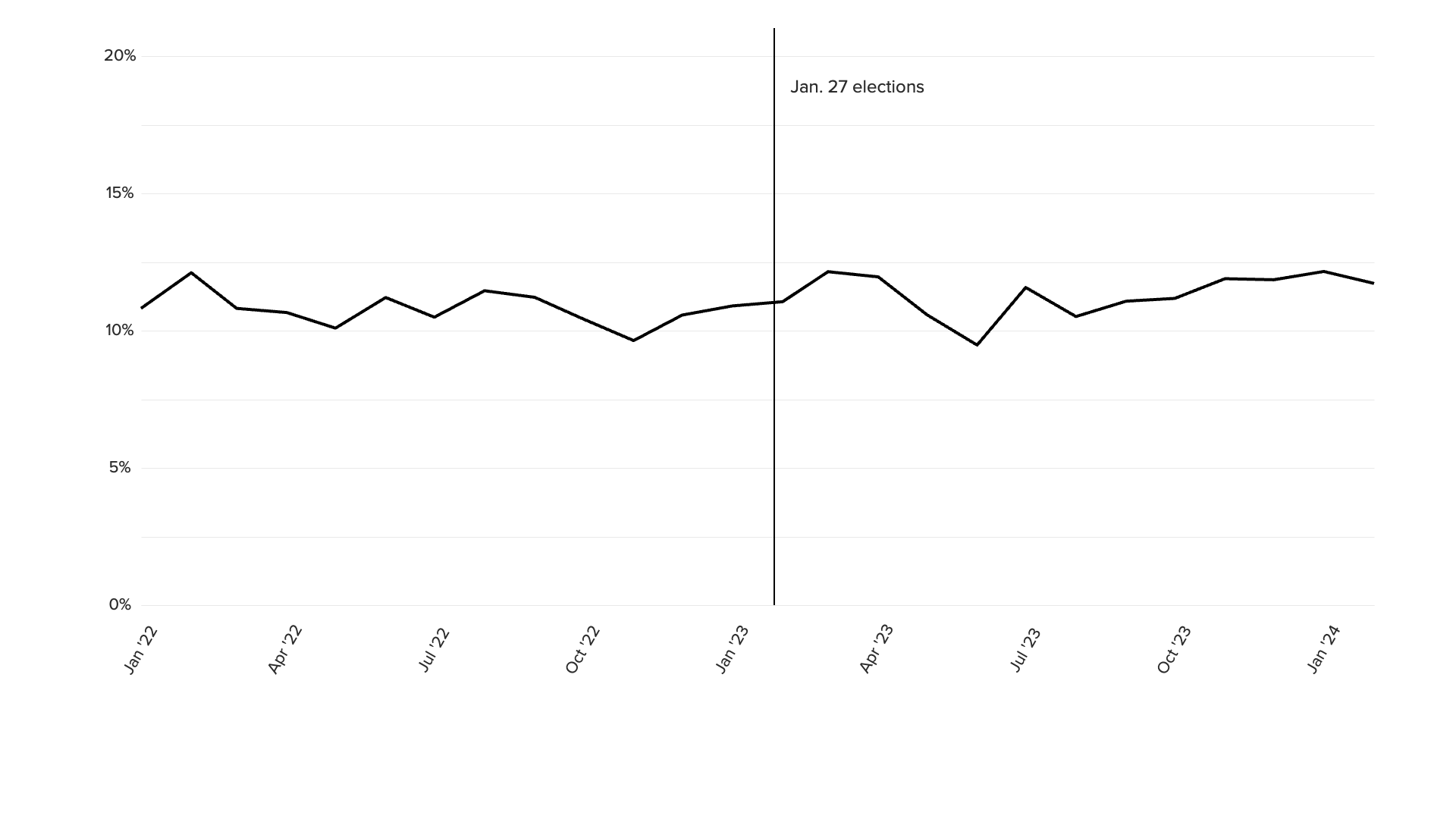Global Elections in 2024 Could Open a Pandora’s Box of Political Polarization

Key Takeaways
In a record-breaking year of global elections, Morning Consult has launched a political polarization tracker covering 25 major global democracies.
Polarization is a major risk to business both from a communications and policy continuity standpoint, and is correlated with democratic decline. Our tracker is intended to help businesses and other interested parties measure, forecast and manage these risks.
This memo outlines the design of our polarization metric, compares it to an external benchmark, and provides illustrative country examples drawn from Brazil, Turkey, the United States and other markets.
Our data reveals that elections are polarization engines, with levels of extreme ideology spiking around them in most countries tracked, driven largely by growth in far-right sentiment. In many cases, polarization returns to baseline slowly, if at all.
These trends sound a cautionary note for democracies with elections in 2024 and for businesses that operate there. Companies engaged in scenario planning through 2024 and beyond should plan on polarization to outlast this year’s global election super cycle.
There is a specter haunting democracies
Civil society organizations have been sounding the alarm about the declining state of democracy worldwide. Several causes have been identified, including the emergence of a near peer competitor to the United States pushing an alternative model (China), the perceived failure of democracies to deliver equitable economic outcomes, and technological change. But perhaps more than any other driver, researchers have pointed to political forces tearing at democracies from within. Polarization which divides society into “us” versus “them” dynamics is in turn correlated with democratic decline.
Measuring polarization in key democracies is increasingly vital for business leaders seeking to quantify political risk in major global markets where they operate. Polarization has real-world impacts on businesses and markets, especially for public communications around social issues and for political scenario planning. In line with other experts, this is why we view it is as one of the top global risks in 2024.
Tracking political polarization
To help businesses measure and manage risk, Morning Consult has launched a new political polarization tracker across 25 democracies where we conduct daily surveys. We define polarization as the share of respondents who say they hold political views that are furthest to the left and right of a seven-point ideological scale.
Global Political Polarization, Feb. 2024
While individuals’ perceptions of political ideology undoubtedly vary country to country, the levels of polarization measured on this scale make sense when placed against the backdrop of real-world events. In Brazil, efforts to investigate former right-wing President Jair Bolsonaro for his role in the Jan. 8, 2023 Congress attack in Brasília have brought his right-wing supporters into the streets in droves. With roughly 37% of Brazilians espousing either a far-right or far-left political ideology as of February 2024, Brazil is the most polarized country in which we currently track political sentiment on a daily basis. In second place, Turkey has long been considered a highly polarized country, and closely contested elections in 2023 revealed the durability of the deep-seated ideological rifts in Turkish politics. Other countries near the top of our polarization ranking like Italy and France have seen growing support for far-right parties in recent years, even beyond observed levels of adherence to far-right ideology.
The right wing is in the drivers’ seat
These days, it is the political right that is dominating the extremes of the ideological spectrum, with very few countries witnessing a larger share of adults espousing extreme-left views. Mexico is the noteworthy exception, with left-wing populist Andrés Manuel López Obrador continually ranking as one of the most popular leaders in Latin America (and beyond).
See our Global Political Polarization Tracker and companion chart pack for both left-right ideological splits and a breakdown of the full scale for all 25 countries.
Comparing our high-frequency measure to a traditional polarization metric
We compared our high-frequency measure of political polarization to a well-known external indicator compiled by the Varieties of Democracy Institute (V-Dem).1 V-Dem’s methodology is based on annual expert assessments of levels of “us vs. them” polarization on a five-point scale. While both measures of polarization are quite different in terms of their underlying construction, the top 10 countries on our polarization ranking all had positive scores on V-Dem’s polarization scale, indicating more harmful polarization.
Because Morning Consult surveys thousands of respondents daily, our data enables us (and our clients) to track levels of political polarization in near real-time. An obvious advantage of real-time tracking is the ability to look at changes in polarization around major events such as elections.
And in fact, several of the countries where our rating reported recent increases in polarization were those in which elections took place in 2023. These include Poland, the Netherlands, Spain, and Switzerland. In short, elections seem to be polarization engines.
Elections prime polarization
Of the 25 democracies in our tracker, 13 held national elections in the last two years. In most of those countries, political polarization reached a high water mark around the time of the election. In many cases, the share of respondents espousing extreme political views was five points higher around election time compared with several months prior.
Combined shares of adults in each country who say their political ideology is either furthest right or furthest left on a seven-point scale

Be careful what you wish for
Equally noteworthy, in many countries polarization remained elevated above baseline for months after the elections, and in some cases even longer. In Italy, for example, levels of polarization are just now receding to those seen in early 2022, before polarization began ramping up in advance of the September 2022 elections. In Brazil, 18 months after the October 2022 elections, we have still not seen polarization revert to pre-election levels. This backs up other research on harmful polarization, which notes that the “us vs. them” nature of it makes it hard to reverse.
For trended charts covering all countries featured in our polarization tracker, download the chart pack here.
Shortening the spike
Given the prevalence of spikes in polarization around elections, the question for democracy advocates may not be how to prevent this increase, but rather how to more quickly return to baseline. Examining countries like Sweden, where a mere four months after September 2022 elections, levels of extreme ideology had once again returned to levels seen four months before elections, could yield insights into what can shorten the duration of spikes in polarization around major national elections.
Exceptions that prove the rule
Only a few countries buck the trend. In Spain, the July 2023 elections did see a spike in polarization, but an equally large spike took place in April 2022, when far-right party Vox joined a regional government for the first time. In the Czech Republic, polarization appears to have remained fairly steady throughout the 2023 election season, fluctuating within a very narrow band.
And despite relatively high levels of polarization in the United States, a spike in extreme political views did not accompany the 2022 midterm elections, perhaps reflecting their relative unimportance to U.S. voters compared with presidential elections. Instead, polarization climbed to its highest level in recent years during the height of the COVID-19 pandemic in summer 2020 and persisted throughout the 2020 election cycle and its aftermath. Given the brewing rematch between President Biden and former President Trump, we expect our baseline polarization level for the United States to slowly rise in coming months.
Combined shares of adults in each country who say their political ideology is either furthest right or furthest left on a seven-point scale

In a year when billions of people worldwide are going to the polls, we expect polarization in most cases to increase in tandem, as we have observed in several years of historical data. If left unchecked, a global spike in polarization has the potential to harm the very democratic processes that allowed those populations to have a voice in choosing their leaders in the first place, with attendant risks for businesses in the form of policy instability, protests, or electoral uncertainty. We advise business leaders to incorporate a timely measure of polarization into their country risk assessments and scenario planning for 2024 and beyond.
1) Maerz, Seraphine F., Amanda B. Edgell, Sebastian Hellemeier, Nina Illchenko, and Linnea Fox. 2024. vdemdata: An R package to load, explore and work with the most recent V-Dem (Varieties of Democracy) dataset. https://github.com/vdeminstitute/vdemdata
Sonnet Frisbie is the deputy head of political intelligence and leads Morning Consult’s geopolitical risk offering for Europe, the Middle East and Africa. Prior to joining Morning Consult, Sonnet spent over a decade at the U.S. State Department specializing in issues at the intersection of economics, commerce and political risk in Iraq, Central Europe and sub-Saharan Africa. She holds an MPP from the University of Chicago.
Follow her on Twitter @sonnetfrisbie. Interested in connecting with Sonnet to discuss her analysis or for a media engagement or speaking opportunity? Email [email protected].